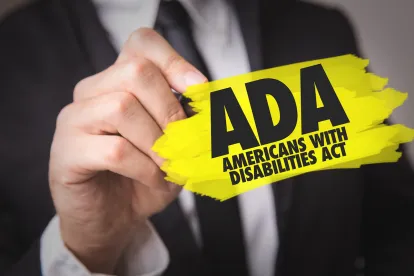Can someone who has no intention of using your services or buying your products sue you because your website is not accessible? In Acheson Hotels v. Laufer, the United States Supreme Court has agreed to hear a case on whether such a “tester” has standing to bring ADA accessibility lawsuits. As we previously reported, website accessibility claims and other ADA accessibility claims are on the rise. Generally, these suits claim that a person living with a disability was unable to use a website or visit a business’s location to purchase goods or learn about products, services, or other information. But what happens when the accusing party never really intended to visit the business’s location or website? Does the person have standing to sue? With an increase in “tester” cases by serial plaintiffs, the Supreme Court has decided to weigh in.
Background on Standing
Under the United States Constitution, a party must have standing to sue. To have standing, there must be an actual “case” or “controversy,” such that the person has suffered a “concrete, particularized injury.” It is longstanding law that the person must have suffered an injury that is traceable to the alleged wrongdoer’s challenged conduct and that can be redressed in court. Stated differently, simply alleging that a business’s location or website is inaccessible is generally not enough. The person must allege that they tried to access the business but were unable to do so, or at least that they were interested in doing so but could not.
In the context of ADA accessibility, there is some divide on the level of specificity a person must plead about their alleged injury. According to the petition for certiorari in Acheson Hotels, the appellate courts for the Second, Fifth, and Tenth circuits have rejected standing in “tester” cases, and the First and Eleventh circuits have held that bare allegations can establish standing, but based on differing theories. To make things more complicated, according to the petition, the Fourth, Sixth, and Seventh circuits have held that visually impaired ADA “testers” lack standing.
The Acheson Hotels Case
Deborah Laufer is a self-proclaimed “tester” plaintiff, meaning she seeks out potential violations and then files lawsuits in hopes of bringing websites into ADA compliance. She has both visual impairments and mobility impairments. She filed suit against Acheson Hotels, alleging that its website did not include ADA-required information regarding the accessibility of one of their properties. Laufer’s complaint, however, does not allege that she ever intended to visit the hotel.
The district court dismissed her claim, finding that she did not intend to visit the hotel and, therefore, did not suffer any injury. The First Circuit Court of Appeals, however, reversed this decision, holding that Laufer had standing. On March 27, 2023, the Supreme Court agreed to hear the case and (hopefully) clear up this circuit-splitting issue.
Takeaways
“Tester” lawsuits are on the rise and have presented challenges for businesses, so this issue is not going away. Hopefully, the Supreme Court will provide guidance on standing and the level of injury necessary to bring an ADA accessibility suit. This decision may or may not slow down the recent influx of these “tester” suits. Until then, make sure your website and physical locations are ADA compliant.





 />i
/>i

